The 2nd Taipei Psychedelic Festival held on December 2nd, Saturday, was an unexpected wildcard among the countless gigs and events around the end of 2023. With the line-up more diverse and dynamic than last year, the climax brought by Japanese volume monster Mainliner was definitely a memorable moment for Taipei indie fans.
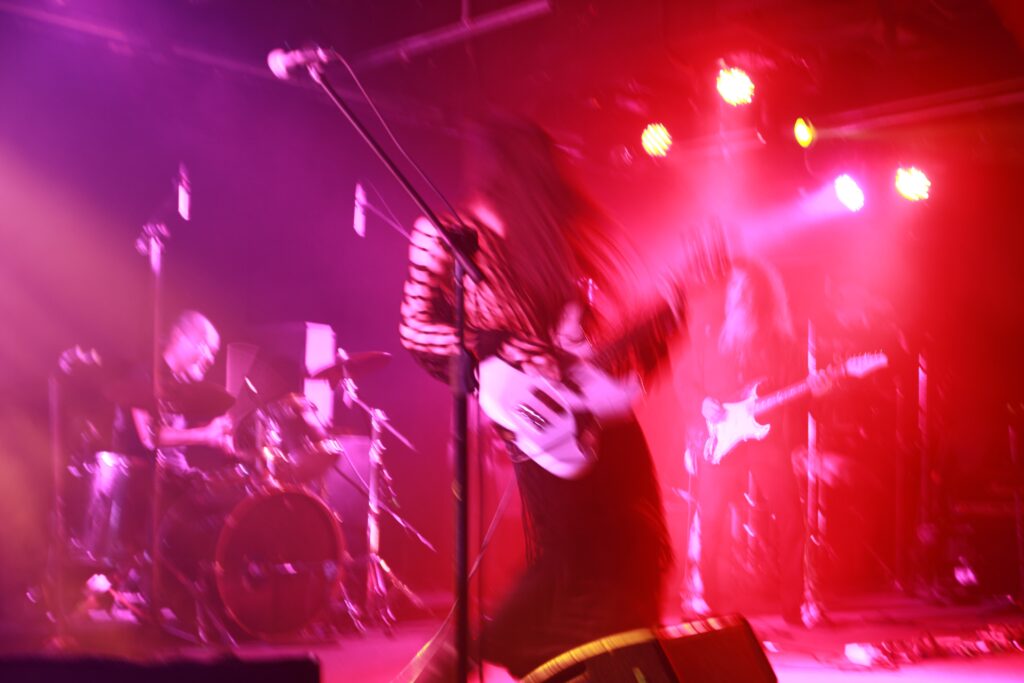
The 2nd Taipei Psychedelic Rock Festival, photo by 蕭植春 Robin Hsiao
The festival was curated by Ryu, the Guitarist of Dope Purple and 林哲瓜, the frontman of Cold Dew. Both were iconic alternative bands that stirred up the more mundane music scenes in Taiwan a little. The festival began with the now four-member band Prairie WWWW. Unlike the guitar-led arrangements in the past, the percussion and synthesizer elements were heightened, carrying a tribal vibe, especially in their final piece, 'Ashen Faces.' The percussionist incessantly struck the gong until the drumming grew weaker, leaving behind lingering echoes until everything returned to calm.
Mong Tong, the new Golden Indie Melody Award winner with their new album Tao Fire last year, expand their sampling range from Taiwan to the entire East Asia. Throughout their year-long world tour, their performance, after more than 30 shows, has become both compact and precise. There were no gaps between songs; amidst eerie red lighting, two members continuously switched between guitar, bass, SPD, and synthesizer, showcasing the enigmatic Eastern psychedelic characteristics. It's gratifying to see old friends and companions gradually evolving into a mature ensemble.
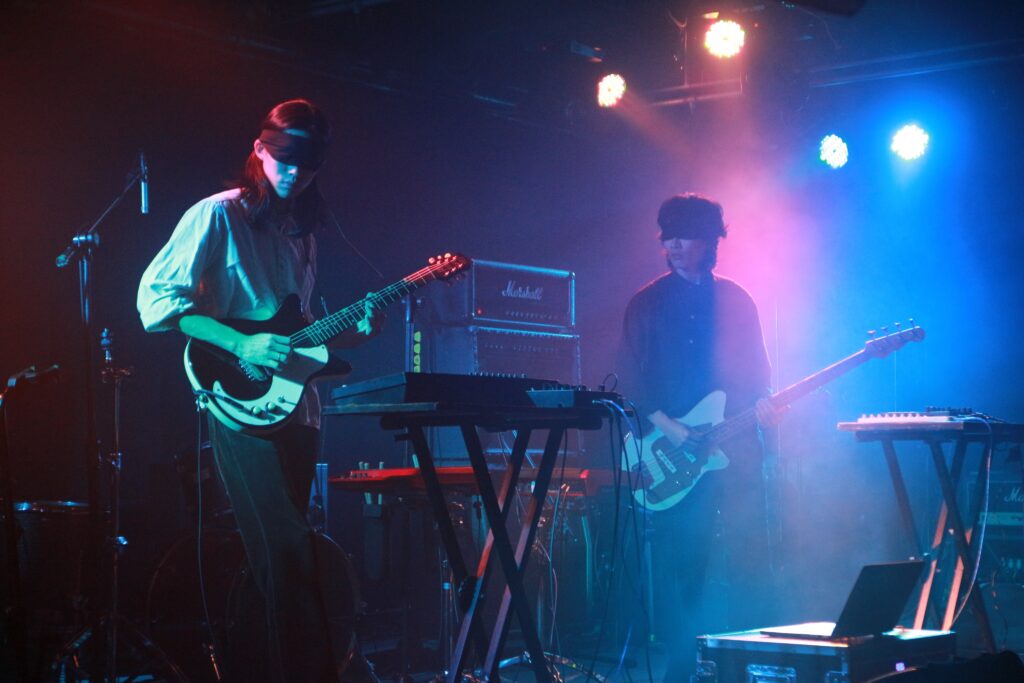
The 2nd Taipei Psychedelic Rock Festival, photo by 蕭植春 Robin Hsiao
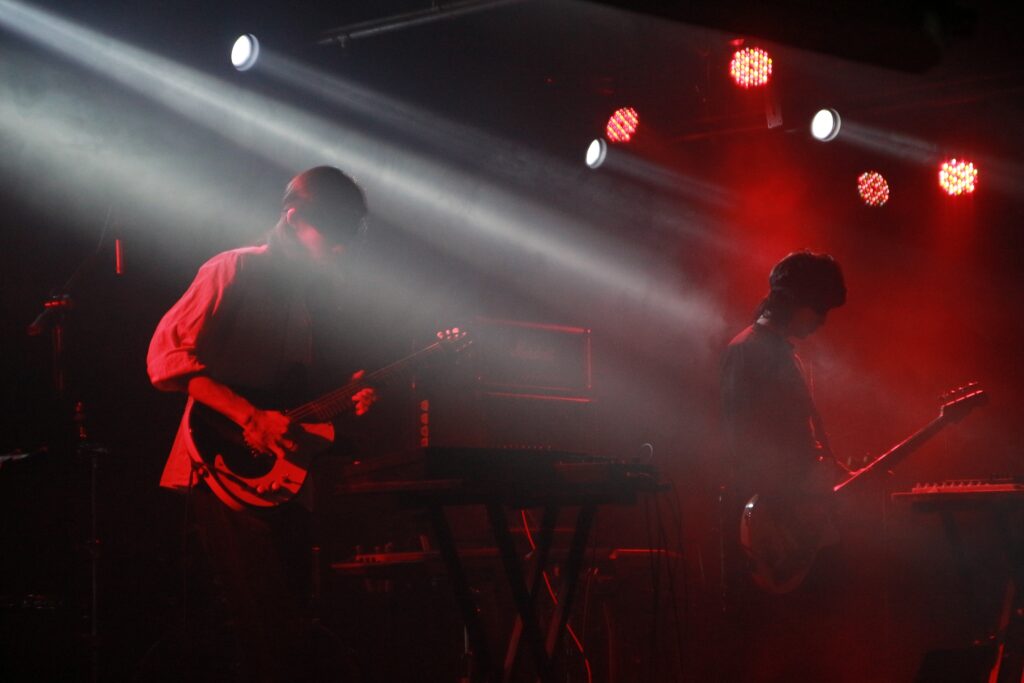
The 2nd Taipei Psychedelic Rock Festival, photo by 蕭植春 Robin Hsiao
Scattered Purgatory, unseen for a long time, had a total makeover and incorporated heavier drones than before. The two of them were scattered in Taipei's most vanguard electronic scene before the group reformed so it's very exciting to see how they combine what they've learned. Both of them reclaimed the instrument, processing the sound to nearly resemble sludge metal—thick, oppressive, and industrially charged. It seemed like a prelude to the upcoming high-volume act as if preparing the audience for an intense experience.
As the ritual vibe was warmed up enough, Mainliner took the stage. All of a sudden, the energy seemed to be sucked into a black hole, despite the deafening soundwaves, there was a sense of silence. Makoto is the band's frontman, yet the audience's focus couldn't shift away from Taigen. Whether it was his torn mesh shirt, or his Kabuki-inspired stage movements, characterized by exaggerated facial expressions drawn from professional wrestling, his vivid and rich display of tension, set upon the dark and heavy music, made everything seem both fashionable and violent.
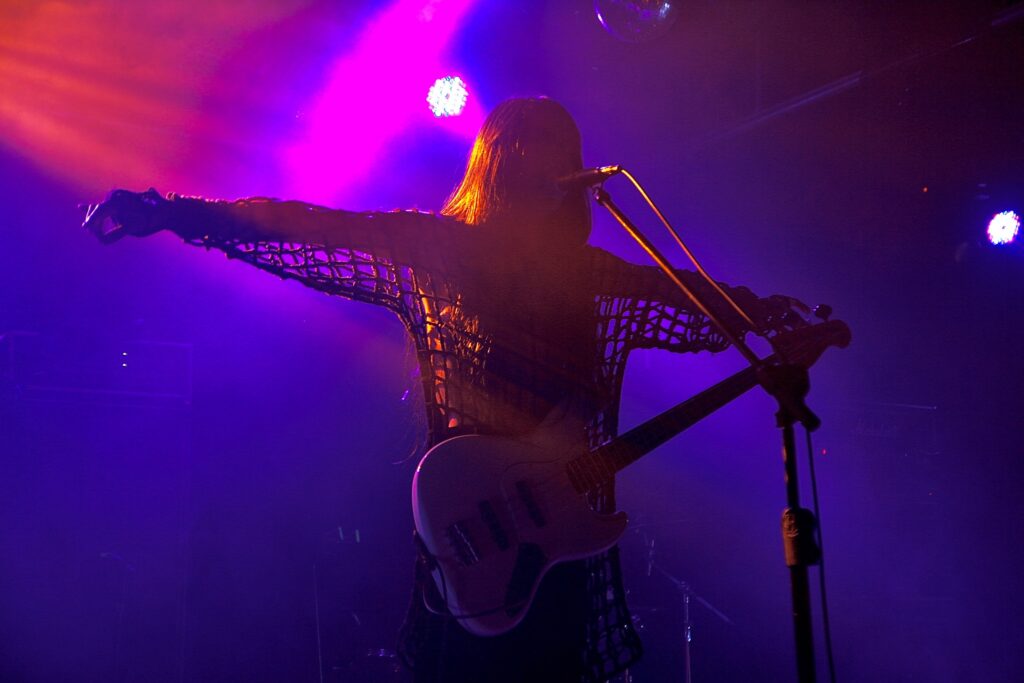
The 2nd Taipei Psychedelic Rock Festival, photo by 蕭植春 Robin Hsiao
The show is way beyond what you can describe as 'loud'. The coexistence of beauty and destruction seemed to leave the audience conflicted, some fled from the high volume but later returned, wishing to see more. I still heard friends saying they prefer the old Mainliner; nevertheless, the current Mainliner already proves that they are one of a very special kind.
The night concluded with Makoto's famous move: crashing guitars and utter chaos. Although tonight was billed as a psychedelic music festival, it offered more extensive musical imaginings than traditional psychedelic rock. From the deafening echoes of Japan's underground music legacy to Taiwan's distinctive temple percussion elements and the avant-garde voices from experimental electronic music, regardless, beyond the long-awaited tinnitus, I gained a lot—it was an immensely enlightening night, in the name of psych.
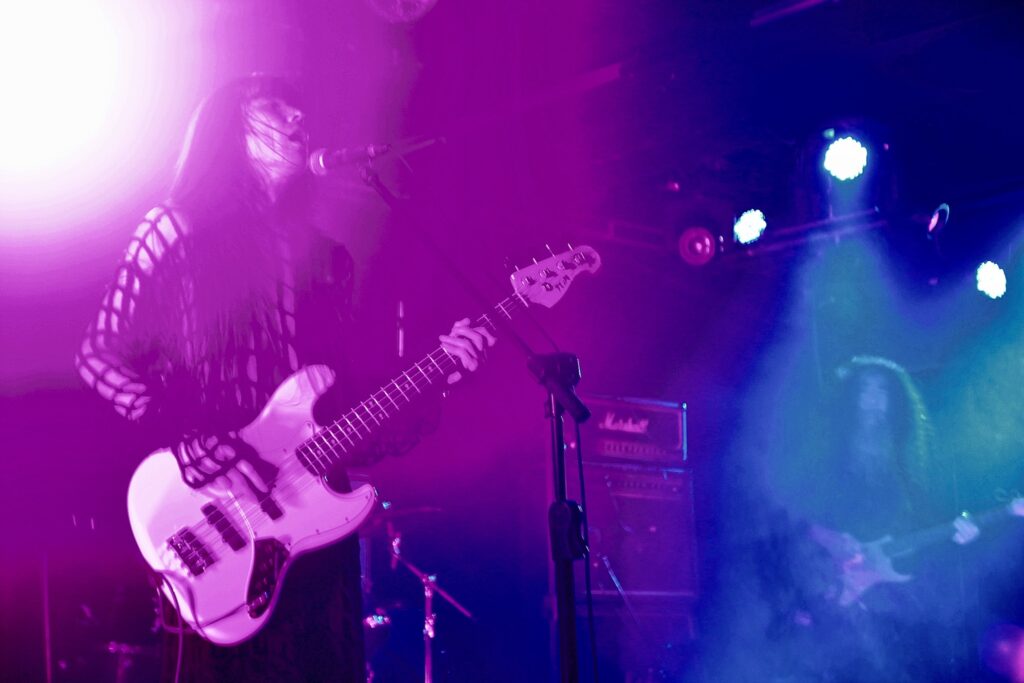
The 2nd Taipei Psychedelic Rock Festival, photo by 蕭植春 Robin Hsiao
After a night of frenzy, we sat down with Taigen Kawabe (bass, vocal) and shared words before the after-party on Sunday started.
Moving to London when 18, now becoming a Londoner for almost 19 years, Taigen Kawabe joined Mainliner in 2013.
Mainliner was formed first by Asahito Nanjo and Makoto Kawabata. Both are legendary psychedelic/ noise artists of the Japanese underground music scene. They went on a journey with the intention of creating a new form of psychedelic music before going on hiatus for years. After a long pause, Mainliner came back in 2013 as Makoto Kawabata (Acid Mothers Temple), Taigen Kawabe (Bo Ningen) and Shimura Kouji (ex Acid Mothers Temple, Miminokoto) and the album Revelation Space was released with this new-born line-up.
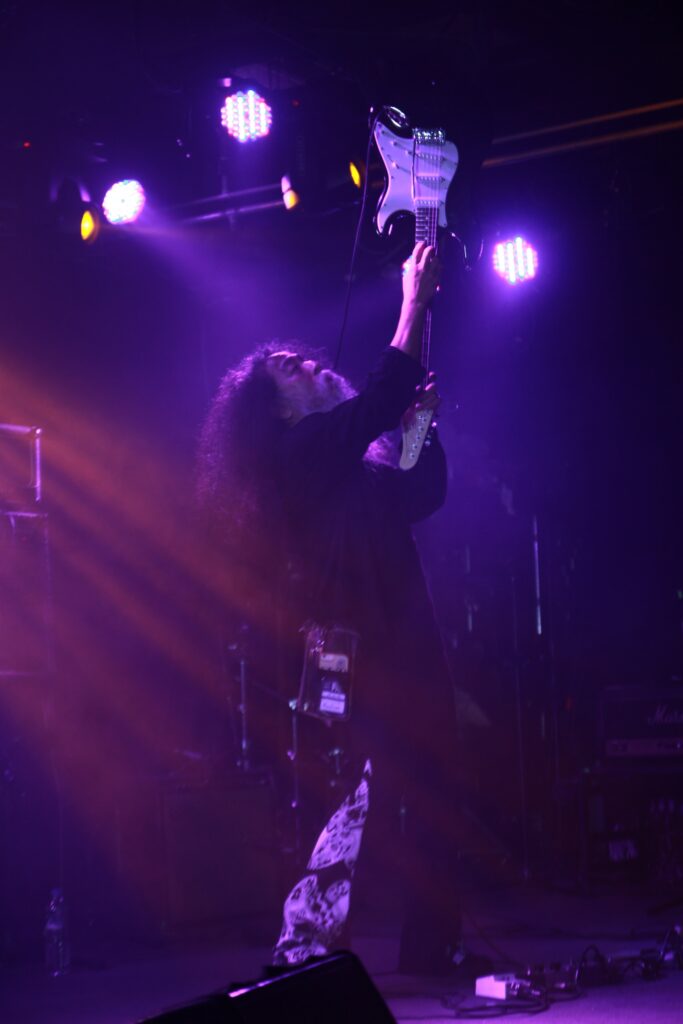
The 2nd Taipei Psychedelic Rock Festival, photo by 蕭植春 Robin Hsiao
Taigen recalled, he first met Makoto in his London flat. At the time he was already a fan of AMT's heavy speedy wall of sound. During one of AMT's EU tours, a mutual friend, the drummer from the post-rock band Stearica asked to see if he had some space for AMT members to crash in. The two soon bonded through Whiskey and music talk "I even asked Makoto to write some comments for Bo Ningen's first album when releasing Japanese version". Shortly after that, Makoto was thinking of rebooting Mainliner and suggested that Taigen may be the perfect option for bass, hence the reform.
While Taigen mostly stays in London and dedicates to Bo Ningen, a four-piece noise/psychedelic band, Mainliner still works through the very old-school way: jamming. When all three members are in Japan, they will go to a rehearsal studio. Makoto will come up with the riff and they will jam and record it straight away. "There is no rehearse. Just riff, solo, back to riff, guitar solo, chaos." Simple as that.
Majoring in sound art and sound design, Taigen's college research focused on noise, in terms of noise music and noise as an unwanted sound or information. The geeky research topic somewhat led him to know how the predecessors make rough yet edgy music. The way that Makoto uses an SM 58 mic with almost every recording is a pure inspiration for him. Moreover, once the arrangement of the track is done, Taigen usually adds the vocal on top of it when coming back to the UK.
"I think I recorded the vocal for the first album in the bathtub of my parents' house in Japan". Once read that Yamataka Eye, a Japanese vocalist and visual artist from Boredoms used to record his vocals the same way, Taigen tried to integrate what he learned in school, not in a sound engineer nor music industry way, but rather in experimental and DIY rooted.
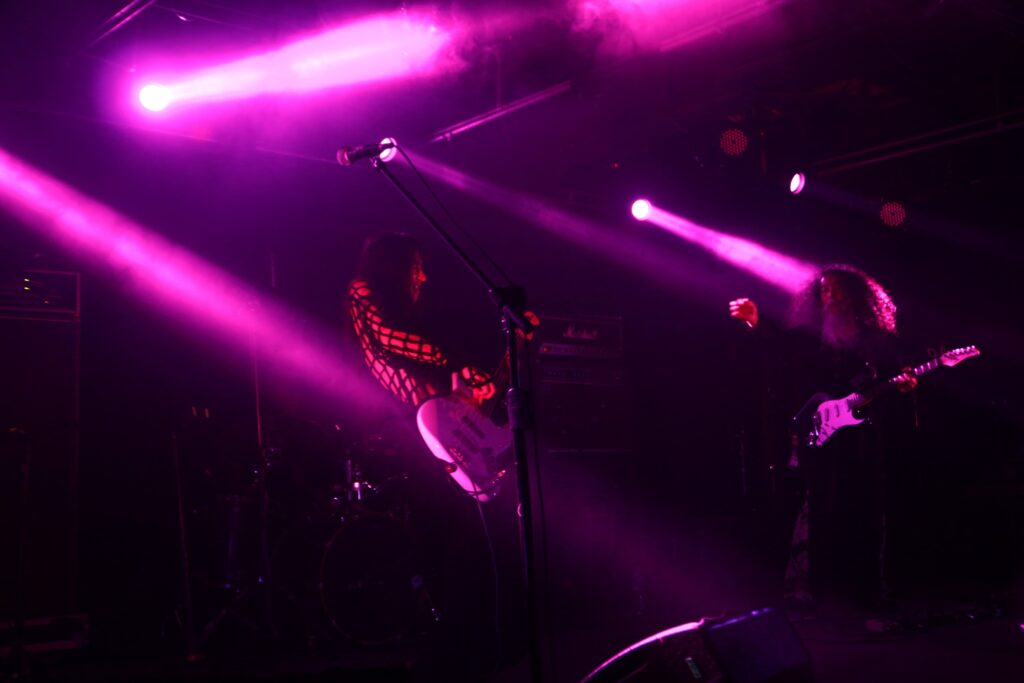
The 2nd Taipei Psychedelic Rock Festival, photo by 蕭植春 Robin Hsiao
When asked how he switches characters between different projects, though Mainliner, Bo Ningen and his solo act might all be considered as noise or psychedelic music, Taigen suggested that he uses different parts of his brain to distinguish different projects. The workflow between these three units also differs. Bo Ningen goes with a try-and-error mode while creating music. Now as all Bo Ningen members are scattered among London, Stockholm, and Amsterdam, they composed throughout sending each other files. As for his solo act, inspired by younger DJ, rappers and track makers who make 2 to 3 tracks in a day, Taigen tries to create his own work at the same pace as these young artists.
The hardest challenge is trying to make every decision on his own. Mainliner lies somewhere in between these two. As for the creative process and during performance, songs from Bo Ningen are already quite long, but Mainliner’s music is even longer, with some tracks more than 30 minutes. To him, Mainliner is like Marathon. Bo Ningen is a mid-length 1.5 km running whereas the solo act is sprinting.
In the cluster of loudness within Mainliner's live performance, one can still sense a structural regime lying under the chaotic surface. "After a couple of shows, Makoto told me I can do whatever I want, try out different things. Somehow, we played songs much longer. Not so much of heavy psychedelic but minimal hypnotic way." One of Taigen's key influences is the modern guru Steve Reich, who to him is kind of the gateway to fall into contemporary music.
Playing bass at the age of 15, the young Taigen back then considered that band music was the best. However, a friend showed him Radiohead's Kid A and King Crimson and handed him a whiskey coke in pitch black room which revealed a whole new world to him. And it is the same friend that showed him Steve Reich and Brain Eno, making the new world even bigger.
Whirly chaos has often been the center of Japanese unconventional music. Growing up in Shibuya, violence and chaos have been in fringe of his life. Taigen remembered hearing Yakuza yelling on the phone, trying to collect debt in the same building as his childhood home. One of Aum Shinrikyo’s branch departments, before the tragic incident happened, was 5 minutes walk away from home. There were strange rituals filled with pink costumes and elephant masks. He also remembers pink flyers of the uncensored erotic movies that he would take from the street postbox and keep secretly. "I never actually involved in any violent scene such as joining any local gang, but I can smell it close enough."
Though wasn't surrounded by real violence in school, Taigen used to enjoy watching wrestling. The way wrestlers intimidate their opponents gives him the thought of playing bass with an exaggerated facial expression. "There is a Japanese saying if one person is really devoted, you can say that he plays something by the face."
In recent years there has been a trend of oriental psychedelic/ psychedelia, alongside the burst of psychedelic music fests. Western fest curators and music diggers try to discover the unconventional non-Western music that sounded psychedelic-ish. Mainliner and Bo Ningen, with the frenzy onstage performance, seem quite fit into the category as they both were on the line-up of several psych fests. However, it irritated Taigen in the early days that people considered his creative work psychedelic.
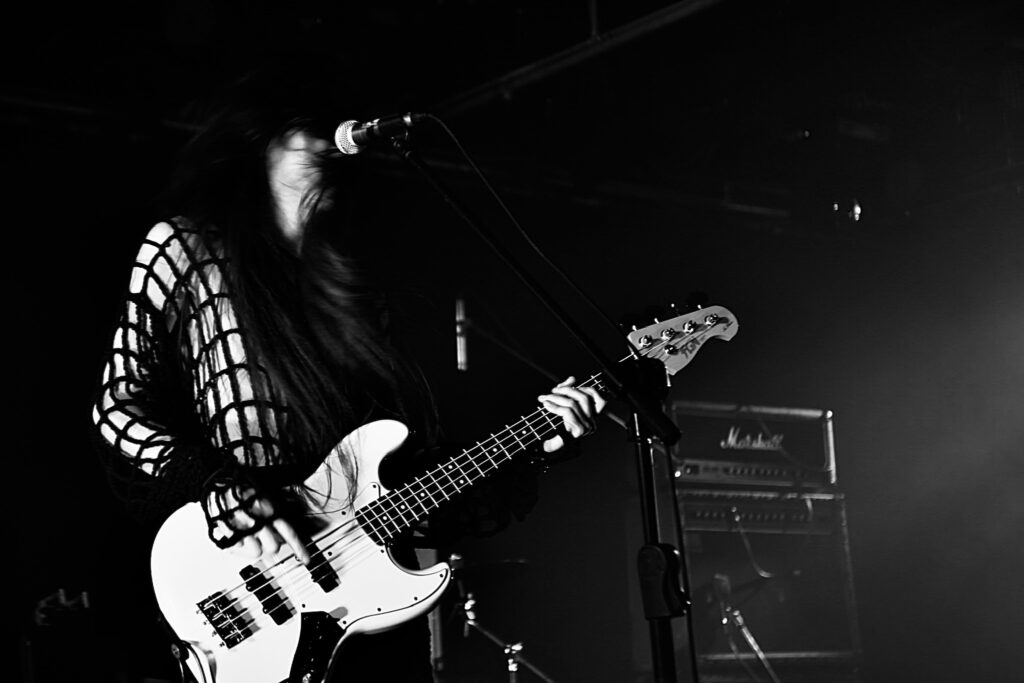
The 2nd Taipei Psychedelic Rock Festival, photo by 蕭植春 Robin Hsiao
"UK media liked to ask us the relationship between our music and hallucination drugs." The media used to tag Bo Ningen as acid punk or psychedelic rock but he never tried any of those in his 20s. Taigen vividly remembers Makoto once said in an interview that a good drug dealer cannot be junky. As he considers all his music somewhat drug-liked, additive, and mesmerizing, he would stay conscious when onstage, just as an urban shaman, weaving the tension of the crowd into the known.
When talking about music, Taigen speaks from the bottom of his heart. In a humble and friendly way. It is not easy to overlap the nice fellow in front of me with the dark creature on stage last night. Still, just like the two sides of one coin, the childhood experience, the teenage stage and the college research, all are accumulations which led him to what he is now. "Now I think It is okay for the audiences if they want to use any recreational drug while enjoying our music." Taigen concluded "Just remember, psychedelic can be anything, alcohol, instant junk food. And it can definitely change one's character or even nationality."





